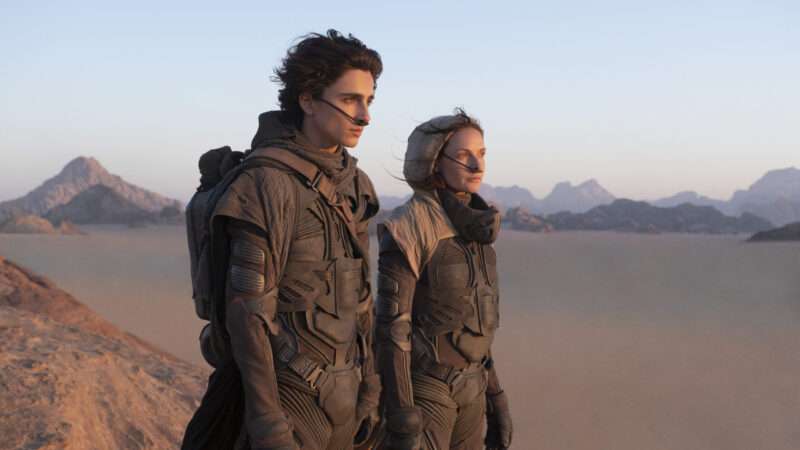

NOTE: This review has minor plot spoilers for those who have not read the book.
Last night, my wife and I saw Denis Villeneuve’s Dune movie. It was our first trip to a movie theater since before the pandemic, and definitely worth the wait! The new movie is by far the best cinematic treatment of Frank Herbert’s classic 1965 science fiction novel of the same name; clearly superior to the 1984 David Lynch movie, and the 2000 Sci-Fi Channel mini-series. Relative to the confused muddle of the former, it does a much better job conveying the characters and story. It also features vastly better acting, CGI, and special effects than the miniseries (which was more faithful to the book than Lynch’s movie was). Villeneuve clearly knows what he’s doing, and I can’t wait to see Part 2 (which was recently greenlit and scheduled for release in 2023).
The complex story of Dune is difficult to summarize. But it revolves around a struggle for power between two noble houses – the Atreides and Harkonnens – centered on the desert planet of Arrakis (which both seek to control). Arrakis is the only known source of the Spice, the most valuable substance in the universe, because it is necessary for interstellar space navigation and also facilitates extension of human lifespan. The Harkonnens, who ruled Arrakis for decades until Emperor Shaddam IV – ruler of the known human Universe – ordered them to transfer it to the Atreides brutally oppressed the native Fremen people. Paul Atreides, who gradually becomes the main character of the story, is the heir of the Atreides leader Duke Leto. He is gradually revealed to have vast psychic powers that – combined with the support of the Fremen – might eventually enable him to overturn the established political order.
The actors, special effects, and pacing of the new movie all do a great job of capturing the plot and atmosphere of the book. I think it effectively gets across a good deal of the political message, as well: The manipulative nature of political authority, the dangers of charismatic leadership (though this theme is a bit less prominent than in the book), and the lure of power.
I have read the book numerous times, so cannot easily imagine how the film might appear to those who never read it. But I think they should at least be able to follow the general gist of the story, in a way that wasn’t possible with the 1984 movie.
Part I goes for over 2.5 hours covers only slightly more than half the book. It therefore conveys more of the plot than the 1984 David Lynch movie. But some things did end up getting cut. The Harkonnens (the Baron, and especially his “mentat” adviser Piter de Vries), Atreides mentat Thufir Hawat, Atreides house physician Dr. Wellingont Yueh and (to a lesser extent) Atreides military leader Gurney Halleck, all get the short end of the stick. Much of this is unavoidable. But people who read the book will feel some of these losses keenly.
On the other hand, the actors playing Paul, his mother Jessica (Duke Leto’s “bound concubine”), and the Duke all capture those characters well, as do the Fremen characters (though the latter only come on near the end). I am somewhat ambivalent about this depiction of Duncan Idaho, another key Atreides officer. But most other viewers seem to like it.
Villeneuve is a master of economical exposition, as a result of which he gets across the politics and society of the Empire and Arrakis very well, using minimal screen time to do so. Nonetheless, a few elements got shortchanged: most notably the mentats (virtually not even mentioned), and the role of “imperial conditioning” (which makes Dr. Yueh’s betrayal especially shocking).
Viewers who haven’t read the book may be confused about why this far-future/high-tech society has so little in the way of computers and artificial intelligence, and why they use blades so much more than missile weapons. The answer to the first question – conveyed in the book – is the society’s rejection of most artificial intelligence as a result of the Butlerian Jihad (a war against powerful AI that had begun to dominate humans). The answer to the second (also described in the book) is the widespread use of shields that make missile weapons ineffective in most situations.
In this depiction, Paul is less conflicted about his potentially destiny than in the book, and seems more ready to embrace the role of leading the Fremen and (eventually) becoming Emperor. This seems a conscious effort on Villeneuve’s part to avoid creating the (false) impression that Paul is the hero/savior of the story. The “white savior” interpretation of Paul is grossly unfair to the book, and this version repudiates the idea even more clearly, I think.
However,unlike the Lynch and Sci Fi Channel versions, Villeneuve’s Dune does depict the Atreides as almost entirely white, even as almost all the Fremen are either black or Middle Eastern. There may be some PC/”Woke” blowback over this choice (though it does not bother me). And it might lead to renewed more deployment of the “White Savior” trope.
Dr. Liet Kynes, the half-Fremen ecologist who represents imperial interests on the planet, but is also secretly a Fremen leader, is gender-flipped to being a woman. That doesn’t by itself bother me. But the screenwriters clearly didn’t consider that a female Kynes would have had far greater difficulty in being accepted as a Fremen leader. This is one of a number of subtle ways in which Villeneuve downplays the profound sexism of Fremen society (which is more fortrightly depicted in the book). The Imperials are also sexist (this the movie does note), but not quite to the same degree.
While most reviews of the movie have been favorable, one recent Washington Post commentator has attacked it for supposedly downgrading the influence of Islam on the setting of the book, especially the culture of the Fremen. This critique is so off-base that pointing out all the flaws would require a post of its own, at least as long as this one already is. Here I will point out just a few of its shortcomings.
Because of the point at which this movie breaks off, we only spend a short time among the Fremen (mostly just the last 15-20 minutes of the movie or so). We will likely see much more of their culture in Part 2. Still, what we do see of the Fremen is more than enough for viewers to think of them as analogous to Arab Muslims in crucial ways.
In addition, it is a mistake to assume that the point of the story is to exalt the native culture of the Fremen, and praise their resistance to oppression. While the Fremen are indeed oppressed by the Harkonnens and other “outworlders,” Herbert makes it clear that their own society is also deeply oppressive and hierarchical. Also, much of their religion and ideology is the product of outside manipulation intended to prepare the way for Paul’s ascension to the status of charismatic religious and political leader.
While implicitly condemning that manipulation, Herbert does not suggest that everything would be fine on Arrakis if only “authentic” Fremen culture were restored, and the planet freed of colonialism. Much the contrary, in fact. Paul is not a “white savior,” and indeed he is not the hero of the story, at all. But neither is this a simple story of good indigenous people battling evil colonialists.
If there is a flaw in Villeneuve’s depiction of Arrakis, it is that he buries the negative aspects of Fremen society, and thus at times seem to buy into a crude “natives good, white colonialists evil” narrative. The handling of Fremen sexism is just example of this problem. However, as already noted, we don’t actually see much of Fremen society in Part 1. This issue might be handled better in Part 2.
I have a few other, more subtle, reservations about Part 1. But, overall, it’s an impressive achievement! If you love the book and/or science fiction in general, you should definitely go see it.
from Latest – Reason.com https://ift.tt/3vWZpUp
via IFTTT